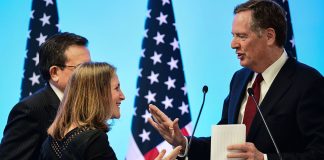Targeting Belarus. The European Commission announced on Wednesday temporary new measures to toughen asylum processing rules on the Belarusian border. Poland, Latvia and Lithuania will now be able to take up to four weeks to register asylum applications rather than 10 days and may hold migrants in processing centers for up to four months. The bloc also agreed on new sanctions against Minsk targeting 17 Belarusian officials and 11 companies. Brussels has accused Minsk of facilitating migrant crossings through its border to punish EU members for imposing earlier sanctions.
Eyes on Moscow. An annual summit of the Organization for Security and Cooperation in Europe began in Stockholm on Thursday. Security issues, particularly tensions on the Russian-Ukrainian border, will dominate the talks. U.S. Secretary of State Antony Blinken and Russian Foreign Minister Sergey Lavrov met on the sidelines of the event. Blinken again expressed concerns over “Russia’s plans for renewed aggression against Ukraine.” Meanwhile, the EU’s foreign affairs chief met with Ukrainian Foreign Minister Dmytro Kuleba on Thursday to discuss economic restrictions that could be imposed on Russia if it launched a new offensive against Ukraine.
Making changes. Turkish President Recep Tayyip Erdogan dismissed Finance Minister Lutfi Elvan as the Turkish lira continued its precipitous fall. Elvan had opposed the lowering of interest rates by the central bank, a move that encouraged the currency’s decline. His newly appointed replacement, Nureddin Nebati, had served as deputy finance minister and supports Erdogan’s low interest rate policy.
U.S. expansion. The U.S. Army secretary said the Pentagon is still urgently looking for new basing opportunities in Southeast Asia. A top priority, according to the secretary, is finding places to deploy ground-based missiles – something that would be key to countering China’s own naval and missile buildup in the region. This comes after the Pentagon’s force posture review made clear that the immediate priority is to bolster the U.S.’ existing bases across the Indo-Pacific. Easier said than done.
Abe’s warnings. Former Japanese Prime Minister Shinzo Abe caused quite a stir with China by saying the quiet parts out loud about China’s creeping aggression around Taiwan and elsewhere in the Indo-Pacific. Among other things, Abe said Japan and the U.S. could not simply stand by if China attacked Taiwan. Despite his abrupt retirement last year, Abe, who was Japan’s longest-serving postwar prime minister, is still extremely influential in Tokyo. His comments earned Japan’s ambassador a scolding in Beijing.
Back on track. U.S.-Mexican relations appear to be getting back on track. U.S. officials reported that two dozen Drug Enforcement Administration agents finally received their visas to work in Mexico after waiting more than six months. In addition, Mexico’s Foreign Ministry announced the launch of a new joint program with the U.S. called “Sowing Opportunities” aimed at encouraging development in Guatemala, Honduras and El Salvador and stemming the flow of migrants from the three Central American countries.




 Special Collection – The Middle East
Special Collection – The Middle East